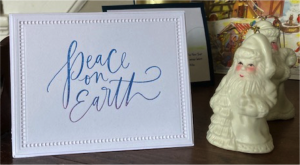
Card by Joanna Reiner Wilkinson
Uncategorized
Purgatory Road, by Charles Coe
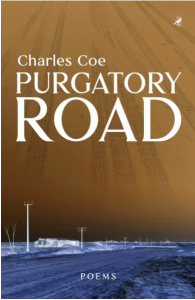
One autumn day when I lived in Massachusetts, we took the children to Purgatory Chasm, a park in Sutton with a playground, nature trails, and the chasm itself. Only some of the adults and older children attempted the difficult path between looming rock walls. There were strange and unworldly formations: deep clefts, overhanging boulders. I found it unsettling.
I remember that feeling whenever I drive past the exit for the chasm, and again when I heard Charles Coe read from his new collection of poems. In the title poem he explores his early understanding of purgatory, summoning with characteristic vibrancy “the dust-covered relics” of his Catholic schooling. As in the best meditative essay, we engage with him as he sorts through these memories and carries them forward into a new understanding of what it means to be us, today, in this damaged world.
Coe’s superpower in these poems is his generous heart. Small things that strike his attention, such as a truck that won’t start in a grocery store parking lot or a woman talking to herself on a traffic island, lead us to understand what it is like to inhabit someone else’s life. Channeling Forster’s call to “only connect,” Coe’s poems from 2020’s lockdown trace what we’ve lost and our attempts to communicate across the void.
In other poems, he invites us to recognise how it feels to be a person of color is our society. He writes feelingly of his father being belittled by a young white drugstore clerk in the 1960s, and what he understands now of the difficult terrain his father had to traverse.
He writes too of his own experiences. He shares with us the everyday things that, unlike the great glacial gush that created Purgatory Chasm, wear away at one. It might be a stink eye from a doorman or an uncurtained window at night. The six-line poem “Things White People Have Said to Me” begins:
You’re so well-spoken.
You don’t seem like you were raised in a ghetto.
In “Blocked” he writes about an encounter in the parking lot. The tone of this poem, as in others, is one I struggle to achieve. Because it is calm, aware, restrained, we reading it are free to feel our own outrage, our own concern about possible consequences, and our own recognition that we are all imperfect beings.
Coe’s sense of humor inflects many of these poems, sometimes wry and subtle, sometimes flat out hilarious, as in “Butt Dialing Jesus” which begins:
There was a time when voices emanating from my pants
would have caused concerns. But now I simply shrugged
and pulled out my phone . . .
It is a joy and a comfort for me to read such poems. Their effect on me is similar to that of Claire Keegan’s Small Things Like These, which reminded me of the goodness in this world and its people. While Coe notes the rocks that litter our path and the walls that rise around us, his generous warmth and humor become welcome companions on this journey.
What poems have you read that were both a comfort and a joy?
Unvarnished Life, by Yenna Yi
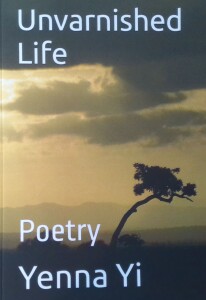
After a full day at the Brattleboro Literary Festival, immersed in poetry from many different voices, I turned to my friend Yenna Yi’s recently published book, one of three poetry collections. Her poems draw on her background as a psychotherapist to celebrate life’s joys and cope with its blows.
She’s also the author of Ring of Fire, a memoir of 14 years living on a catamaran with her husband and two sons sailing the globe. One of the poems in this book recalls that time. “The Stormy Sky” begins:
I remember the days in 1985 . . .
Waking up dancing on the liquid fire
Of gale force wind in the Tasman Sea,
The home of wind—wet, wild,
Lost in the valley of waves,We held onto the halyards
Of the jittering canvases . . .
In another poem, “In the Stealth of Darkness” she tells us: “I’m haunted and besieged / By life’s gifts and punishments.” Yet she finds solace in poetry, the words “forging their way/ Into my heart like a river / Through stone.”
In other poems she examines the uses of memory and the restorative powers of nature. She explains the title in her author’s note, which says in part:
. . . I call my early childhood unvarnished—roughhewn between [the] aftermath of WWII, Korean War, poverty, family separation and loss . . .
However, I find beauty in unvarnished life—turning a shed into a home, making a dress out of rag and drift wood into art . . .
With these poems she delves into the experiences of a lifetime, finding that “A blemished bowl wants to be mended, / A healed scar adds another layer of skin.”
What poems are you turning to as the days draw in and the nights linger?
Haven, by Emma Donoghue
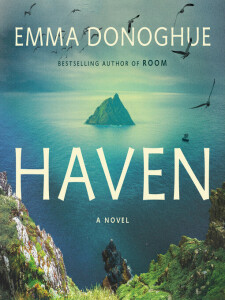
My horror at the devastation wrought by evangelical “Christians” (who eschew the basic tenets of Christianity) in the U.S. made this novel tough going for me. I couldn’t get past my outrage that anyone would submit themselves to torture and starvation in the name of religion when salvation—an earthly one to be sure—was so easily available.
Donoghue, author of Room, has constructed another story where people are confined in a tiny location, dependent on the whims of an all-powerful tyrant. In 600 A.D. Cluain Mhic Nóis, an Irish monastery, hosts a visiting holy man, perhaps the holiest man on earth: Artt, legendary for having read every book in existence and surviving the plague with the loss only of a finger.
While there, Artt has a dream—surely a holy vision!—that he should found a new monastery on a remote island off the Irish coast, far from the earthly temptations that have, in his view, corrupted Cluain Mhic Nóis. The dream/vision/mandate from God further commands that he take two of the monks: Cormac, an older man who came late to religion and is fond of telling stories, and young, impressionable Trian, who was given to the monastery at 13.
They fetch up on a stony isle that it is hard to imagine anyone could survive a week on, though the author’s note assures us that it is indeed the site of a medieval monastery. The fascination for me was in the various ways they—mostly Cormac to be honest—find to survive in this hostile environment. Trian, too, captures the heart with their sweetness and love for everything—birds, fellows, mussels, God. Artt is just, in my opinion, a self-righteous, narcissistic blowhard, convinced that he alone is the conduit of God’s word.
Well, obviously I’m the wrong audience for this book. I could hardly bear continuing to read of their hardships, knowing that civilisation—with, sure, its evils, but also actual sustenance and shelter—is only a short boat ride away. The writing is gorgeous but the story infuriating.
I have my moments of thinking like Artt that the world is incurably decadent, and wanting to preserve some small piece of what life could really be like. But this is not the way. And I’m far too practical to take my minions, even if I could bear to have minions, away from necessities like food, water and shelter to create religious monuments. Nor could I ever sacrifice others to my vision of my own greatness.
So, while I admire the prose, the story left me cold. No, not cold, but a turbulent mix of emotions: frustration, anger, sadness, a hint of longing. The book challenged me to think outside my own box, a challenge I guess I failed. Stil, I’m left thinking of John Lennon’s Imagine: no religions, nothing to die for.
Have you read a novel that challenged you?
Lilacs Still Bloom in Ashburnham, by Fred Gerhard
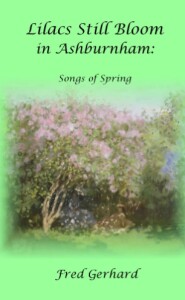
A new chapbook from my friend Fred Gerhard is subtitled Songs of Spring. Like that season, the poems in this tiny book carry sweetness and renewal.
Some of the poems are about everyday happenings, like children gathering dandelions, infused with a whisper of philosophy. Others are tributes to poets, their ideas and voices carried forward into today.
In some poems, striking imagery or unusual word choice captures the reader’s attention. Here’s the first stanza of “Moss.”
I once loved a woman who loved moss, knew moss,
and why the softest moss lay between the
rain-worn stones of indecipherable lives—
The natural world fuels these poems with its grandeur and generosity, its small gifts and minor delights. The beneficent effect of paying attention to the world around us provides a melody for the collection, as in the title poem where the narrator says: “I blossom / breaking my green walls.”
At a time when every bit of news arouses a mix of fury, despair and determination, these poems are a salve to the spirit.
What books or poems do you turn to when you despair at the state of the world?
Small Things Like These, by Claire Keegan
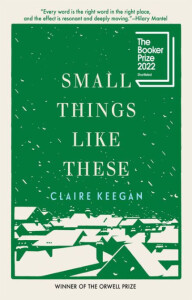
What a gem of a book! This short novel at first seems, as the title indicates, quiet and unassuming. Set in an Irish town in 1985, it follows Bill Furlow who has earned a modest but sufficient position in life. As a purveyor of wood and coal, he refers to himself as “a man of doorways.” True, he is often knocking on doors to deliver loads coal or wood, but the description carries more meanings, both literal and metaphorical.
His background is unusual: an only child of a servant woman whose employer did not dismiss her when the pregnancy became obvious. Instead she kept his mother on and welcomed the child as well. Thus he grew up, while not exactly a member of the family, at least surrounded and supported with love and care from his mother, her employer, and Ned who worked there as well.
Set apart from the town is an orphanage and laundry run by the Magdalen order of nuns. I’ve read a good bit about the Magdalen laundries, so was not surprised by the conditions Bill gradually begins to discover. Yet Keegan presents them so quietly, so carefully through his personality, that they shocked me anyway.
There are many things in today’s world—and in the past as well—that make me despair of humanity. This book reminds me that there is goodness in this world if I am open to seeing it, and that it doesn’t have to be big thing like leading your nation’s resistance against an invading tyrant. It can be a small thing and still break your heart and mend it to be even stronger.
This is the novel I’m recommending to everyone this year. What novel are you recommending to people?
The Years, by Annie Ernaux
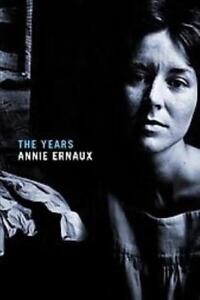
Writing guru Donald Maass—writer, agent, and writing teacher—reminds us to include what’s going on in the world in our stories, partly because our characters will probably be thinking about current events and reacting to them. Mostly, though, because including specific details and big-picture events helps make the world of our story seem real to the reader.
In this book, Ernaux has gone further, focusing on the larger life of a society and placing the life of one woman within that.
. . . the idea had come to her to write “a kind of woman’s destiny” set between 1940 and 1986.
Ernaux’s genre-bending experiment adds a new dimension to the field of life writing. She goes beyond memoir—a subjective view of events in the author’s personal life—and autofiction—a reexamination and fictionalisation of those events—to create a new form that melds both of these with sociology and history. She has captured the sweep of the lifetime simultaneously with that of a person and a generation.
Everything will be erased in a second. The dictionary of words amassed between cradle and deathbed, eliminated. All there will be is silence and no words to say it. Nothing will come out of the open mouth, neither I nor me. Language will continue to put the world into words. In conversation around a holiday table, we will be nothing but a first name, increasingly faceless, until we vanish into the vast anonymity of a distant generation.
Time is the only narrative structure in this collage of private memories, public events, photos, songs, brand names, television, advertising, headlines. There’s no plot, no protagonist, no story question. Instead, we are given “abbreviated memories” spun together, some personal and some common.
It will be a slippery narrative, composed in an unremitting continuous tense, absolute, devouring the present as it goes.
I especially like the way Ernaux, looking back on a long life, refers to the past as a series of “palimpsests.” It’s an effective way to describe the veils that layer over each other as we try to recall how we were.
At first, I felt overwhelmed by the flow of historical events, popular culture, and experiences. I could barely grasp each fragment before it was replaced by another, perhaps because I was listening to the audio version, beautifully performed by Anna Bentinck. Eventually, though, I began to recognise how artfully they had been assembled to create a continuous narrative.
More importantly, I came to feel a part of the story, engrossed in the passing decades and fascinated by the ways my own life interacted with this collective story, merging and sliding apart, only to merge again and again slip away. I began to feel as though she were telling me the story of my own life, with occasional diversions.
Perhaps I should have first mentioned the unique point of view. Unlike most life writing, there is no “I” in the book. Instead—and fittingly for the story of a generation—it is narrated by “we,” as though by a chorus of voices. Apparently, in the original French version, the pronoun used is “on” which is the generic he/she that English is lacking, though it could be translated as “one.” The translator, Alison L. Strayer, has chosen instead to use “we,” which works brilliantly to capture the voice of the collective sections.
Some parts are about a specific woman, spoken of as “she.” As she nears the end of life, she begins to write this book to defy death’s erasure.
By retrieving the memory of collective memory in an individual memory, she will capture the lived dimension of History. This will not be a work of remembrance in the usual sense, aimed at putting a life into story, creating an explanation of self. She will go within herself only to retrieve the world, the memory and imagination of its bygone days, grasp the changes in ideas, beliefs, and sensibility, the transformation of people and the subjects that she has seen.
I plan to delve into other books by Ernaux, winner of the 2022 Nobel Prize in Literature. I can see why this particular book was longlisted for the 2019 International Man Booker Prize. Without getting into the controversy over whether it qualifies as fiction (a requirement for the Booker), I have to rank it high on my list of best books ever. To reach into my own past: it blew my mind.
Have you read a book by Annie Ernaux? What did you think about it?
Living Diversity: Poems, by Lynn Martin
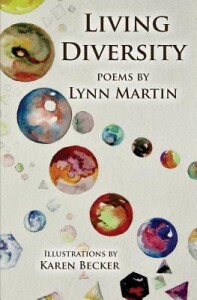
Reading this chapbook is like opening a collection of letters from a friend. (Full disclosure: The author is actually a friend of mine.) They are full of the kind of sharing I most look forward to: Here are my experiences and my subsequent insights; how about you?
In one poem we get memories of childhood, the sounds of skipping rope and rhyming chants summoning the flavor of those days. Then comes the twist of the adult looking back, which aligns with our own shift in perspective from nostalgia to knowledge.
We learn about the author’s assembled family: a combination of adopted and birth children, all beloved. Within this family, a braid of Filipino, African, and Caucasian ancestries, love reigns. More children, in their diversity, touch on the author’s life: climbing a tree, riding a bicycle in wide, persistent circles. Her poems find what they have in common.
She brings a listening ear and open heart to every encounter, such as the one where she is giving away condoms to a group to help stem the surge of AIDS and instead gives us their stories, their fears and illnesses.
Her fresh take on the father leaving for war in 1941, and the resulting loss of home and friends for the second-grader left behind, brings alive the sense of exile from your own life that so many children and adults felt during the COVID pandemic. Yet there’s humor too: She titles the poem “Even Napoleon had a place to go.”
In persona poems, Martin inhabits various young characters, effectively bringing their voices into print. And in some she captures their music, as in “Babydyke Rapper” which begins “Jeans halfway down my ass / T-shirt belly button short.”
This is a fun and heartfelt collection that will set you thinking and perhaps listening more carefully. That’s how it was for you? It was much the same for me.
Are you reading poetry these days? What are some poems that have touched you?
And Sometimes I Wonder About You, by Walter Mosley
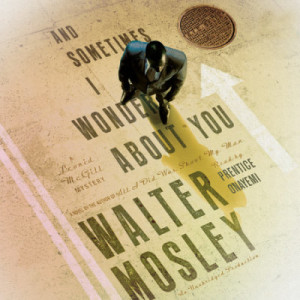
Talk about spinning literary gold from genre fiction! Each Walter Mosley book I read is even better than the last. This 2015 novel is the fifth book in the series featuring Leonid McGill. This New York-based private eye has the strong, if peculiar, code of honor that I always like to see in a protagonist. A former thug who is still mistrusted by the police, he now works when he can to undo the damage his young self wrought.
Although he and his wife Katrina never recovered their marital life after she returned to his house, and they both seek lovers elsewhere, he does love her in his way and feels responsible for her. Of the three children they are raising, only one is his blood child. His son by another father, Twill, is the child he shamelessly loves best, perhaps because he sees a little himself in the independent young man. Leonid has a tight circle of friends and a wide, if often underground, network of contacts.
In this book, he has to juggle responsibilities for work and family. Katrina is still hospitalised from her attempted suicide in the last book. Twill, who has joined Leonid’s agency, takes on a highly dangerous case without telling his father. After Leonid turns down a case brought to him by a homeless man, the man is murdered. The private eye vows to find the killer and tries to ensure the man’s children are provided for. On top of all this, a simple train ride back from a business engagement in Philadelphia turns life-threatening when he helps a woman who is being stalked by a gangster, a woman who is more than a match for Leonid himself and threatens to disrupt his life.
The unexpected twists and overwhelming danger as Leonid tries to resolve each issue kept me glued to the book. The love and integrity and compassion are equally riveting. The brilliant cast of characters, many familiar from the previous books in the series, continue to evolve. Most of all, how the theme of family and the many forms it can take plays out is fascinating.
There are a lot of layers to this book, as there are for any of Mosley’s novels. You can simply go along for the ride or take a little time to consider these characters and what their lives and challenges have to say about our splintered society. Either way, you’ll find this book rewarding. Although you can enjoy it as a standalone, I do recommend reading the series in order to enjoy the subtle ways all the characters grow.
What Walter Mosley novels have you read? What do you think of them?
Writers’ Retreats
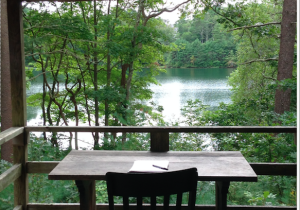
We just wrapped up this year’s Time to Write Writers’ Retreat at beautiful Pinewoods Camp. For four days, twenty writers left our everyday chores and overscheduled lives behind to gather in the woods. We were free to write all day or join optional group activities, such as writing to prompts or critique sessions. In the evenings we came together in front of the fire to share readings, stories and social time. A fabulous cook kept us well-fed throughout.
The retreat was restorative in many ways: jumpstarting writing and providing the opportunity to share our successes, questions, and resources with other writers. Most of all, we reveled in the peace of this magical place: the mist on the pond in the morning, the breeze in the oak and pine trees, the company of birds.
I hope you can find space to step out of your routine for a bit to restore and recenter yourself.
Do you ever go on retreat, even if it’s just a walk in the woods?